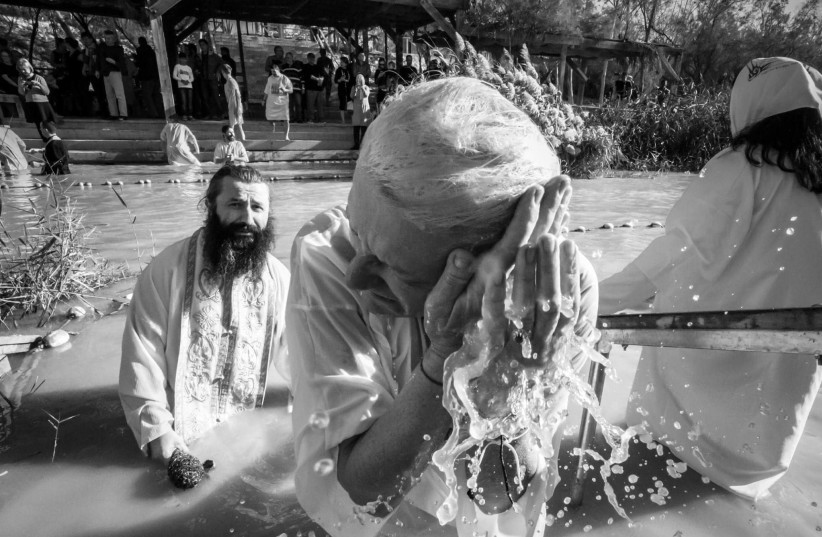Even amid the motley crew with whom he is trying to survive at sea, Jonathan Dade’s introduction as a reality TV contestant makes a splash.
“As a Black rabbi who’s also conservative, if we can’t discuss race, religion or politics, I can pretty much never talk,” Dade tells viewers on the new Discovery/Max series “Survive the Raft,” about nine people from diverse backgrounds forced to work together for 21 days at sea.
In the first episode, which premiered Sunday, Dade says he works as “a senior rabbi in a synagogue in Georgetown, Texas.”
Dade explains his biography as one of conversion. “I grew up Christian and a lot of my friends when I was in the Navy were Jewish,” he tells the audience. “And by me listening, I learned and then before you know it, I’m Jewish, too.”
But the photo montage introducing Dade also includes images of him wearing a tallit, a Jewish prayer shawl, while performing a baptism — a Christian ritual.

The juxtaposition had at least one viewer confused. “I was genuinely excited to see the rabbi, so you can imagine my dismay when the little montage showed him performing an obvious baptism,” one Jewish Reddit user wrote after watching the episode. “Do you think the producers didn’t know the difference?”
The viewer was right to be surprised. Dade is actually a Messianic Jew — someone who believes Jesus was the Messiah, a belief that is antithetical to Judaism. His congregation, Messiah Echad, advertises itself as serving “Hebrew Christian, Torah Observant, Messianic Jewish, and Non-Religious Believers.”
Jewish views on Messianic groups
Messianic groups often have ties to explicitly Christian organizations, and none of the mainstream Jewish movements consider them Jewish. As with many mainstream Christian denominations, missionary work is part of Messianic practice.
But the distinction between Judaism and Dade’s Messianic faith isn’t made apparent on the show, making Dade the latest example of a Messianic being countenanced as Jewish in public life.
Pictures on Echad Messiah’s Facebook page suggest it is not the first time: He’s posted photos of himself at Texas Gov. Greg Abbott’s mansion for Hanukkah parties and a celebration this May of Israel’s 75th birthday, and he can also be seen conducting a public menorah lighting in the center of Georgetown, a small city in central Texas, north of Austin.
Messianics are sometimes selected to offer the appearance of Jewish inclusion, which happens with some regularity in politics. For example, Pennsylvania’s Republican gubernatorial candidate concluded his unsuccessful run last year with a Messianic’s performance of a “Fiddler on the Roof” parody.
In one especially prominent incident, Jewish groups were outraged when a Messianic “rabbi” appeared onstage at a campaign rally attended by then-Vice President Mike Pence in 2018 to offer a prayer for the victims of the Pittsburgh synagogue shooting.
“There are deep theological differences between Jews and Christians regarding exactly who is a Messiah, what a Messiah should do and even how central a Messiah should be to their traditions,” Ingrid Anderson, associate director of the Elie Wiesel Center for Jewish Studies at Boston University, wrote at the time, explaining why Pence’s selection was so objectionable to many Jews.
Anderson noted that most Messianic Jews consider it part of their mission to evangelize to Jews, a practice that is “very painful and damaging” for Jews because, historically, “Christians did not believe that Jewish scriptures contained truths claimed by another religion.”
Dade, who holds a masters in theology from Colorado Christian University, also unsuccessfully ran for mayor of Georgetown in 2020 and again earlier this year; he said he is preparing another campaign for 2026. During his first campaign local media identified him as a “rabbi”; promotional videos for his congregation identify his wife Melinda Dade as a “Rebbetzin,” a term typically employed in Judaism to refer to the wife of a rabbi. Neither he nor Messiah Echad responded to a Jewish Telegraphic Agency request for comment.
“Survive the Raft” is a “Survivor”-esque show that takes its inspiration from a 1973 social experiment by Mexican anthropologist Santiago Genovés, which itself included an Israeli doctor as one of the ship’s crew. The contestants are described as “nine Americans handpicked to disagree about everything,” and include a hunter, a vegan and a conservative mom shown holding an anti-mask sign.
“We do not comment on the religious beliefs of show participants,” a spokesperson for parent company Warner Brothers Discovery told JTA. Requests for comment to Critical Content, the show’s production company, were not returned.
Georgetown has an actual synagogue: Congregation Havurah Shalom, which follows Reform practices but does not affiliate with any movement. Its co-president, Ellen Silverman, told JTA that Dade is a “lovely person,” but added, “We do not recognize the Messianic congregation as Jewish as they believe in Jesus and Jews do not.”
At the same time, Silverman added, “Rabbi means teacher and Jonathan is a teacher for his congregation.”
Whether and how Dade planned to infuse his Messianic ministry into his “Survive the Raft” appearance may never be known: He (spoiler alert) doesn’t stay on the show long enough for anyone else to drill into his faith. He has an on-camera seizure midway through the first episode and is airlifted to a hospital in Panama. At the end of the episode, the show’s host informs the rest of the cast that Dade won’t be returning to the raft.
